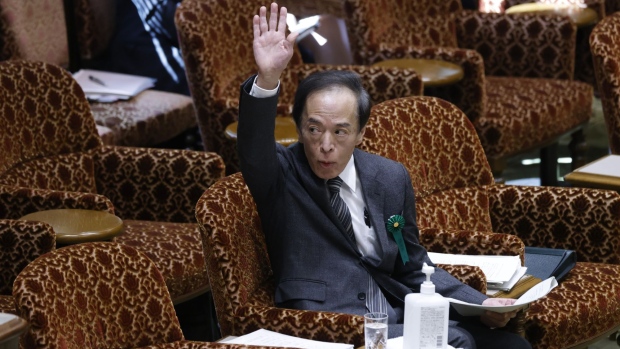Feb 27, 2023
Ueda Says Benefits of BOJ Stimulus Outweigh Side Effects
, Bloomberg News

(Bloomberg) -- Bank of Japan Governor nominee Kazuo Ueda said underlying inflation needs to show a major shift to change the course of monetary policy, a comment that suggests he won’t be seeking immediate change if he is approved to helm the central bank.
At the second parliamentary hearing in the confirmation process, Ueda said the benefits of the BOJ’s stimulus outweighs its side effects, again reinforcing the view that he isn’t seeking a quick move away from a decade of massive easing should he assume his role in April.
Ueda’s comments in support of continuing the BOJ’s 2013 joint statement with the government also added to the impression that Ueda has no intention of shaking things up immediately once he’s approved by parliament.
“I think it’s appropriate for monetary easing to be continued,” said Ueda. “In order for policy to be revised, I think there needs to be a major improvement in the price trend.”
Asked about various aspects of the joint statement including the commitment to try and achieve a stable 2% inflation target as soon as possible, Ueda said nothing needs to be changed for now.
“Ueda made it clear that he won’t be making a big policy shift in haste,” said Tomo Kinoshita, a global market strategist at Invesco Asset Management Japan. “It now looks likely that the BOJ won’t be closing rate differentials with the Fed any time soon.”
Still, Ueda acknowledged that some policy shifts had to come as a surprise to avoid speculation, a remark that may support the view of market players betting on change coming sooner rather than later. Some see the side effects from the BOJ’s yield curve control program as increasingly weighing on the functioning of the financial market.
Some 70% of economists forecast a tightening step by the central bank by July, with 26% of them expecting a move at Ueda’s first meeting in April and June respectively, according to a Bloomberg survey that followed Ueda’s nomination.
Some of them warned of the risk that the bank may tweak its yield curve control program in March before Kuroda leaves office, to give Ueda more time to consider his first move.
Ueda continued to play it safe at the final hearing before a parliamentary vote on his nomination. By pointing out both sides of arguments on topics including the future of monetary policy, Ueda kept his options open for the governorship starting in April.
The nominee added that the BOJ’s overshooting commitment, which ties the bank to expanding its monetary base until inflation goes above 2% in a stable manner, should be continued for some time. Still, “we need to carefully watch to make sure there’s no risk that inflation will overshoot its goal too much,” he added.
Any hints over how he would run BOJ policy are sought by global traders and investors amid intense speculation of policy adjustment under his leadership.
Read More: Ueda Warns Against Magic Solutions, Sticks Largely to BOJ Script
After one of the most aggressive monetary easing programs in modern times, the central bank has become one of the last remaining anchors of low interest rates around the world. Any tweaks to its policy have the potential to jolt financial markets, as happened as recently as December.
Ueda said the challenges faced by the central bank, including its impact on market functioning and its massive asset holdings, present difficulties. He said he would draw on his academic background and his time as a BOJ board member if selected as governor.
“Whoever takes the job, it’s a considerably difficult situation,” he said.
(Updates with further details from Ueda’s hearing, economist comments)
©2023 Bloomberg L.P.





